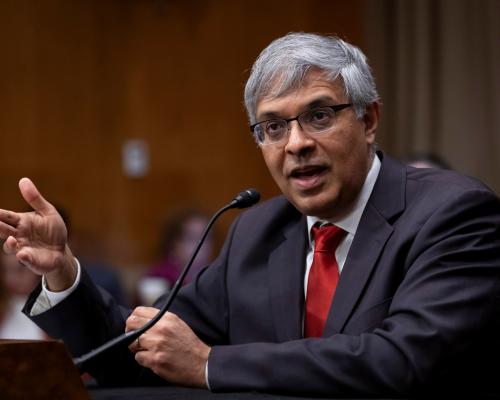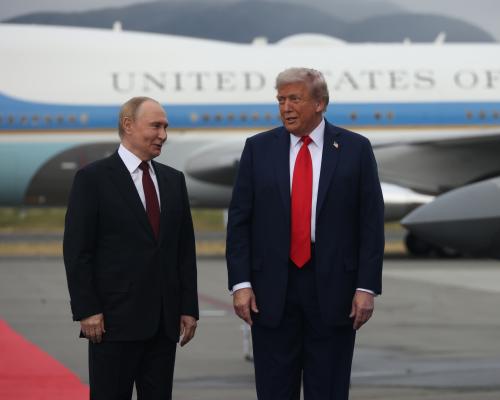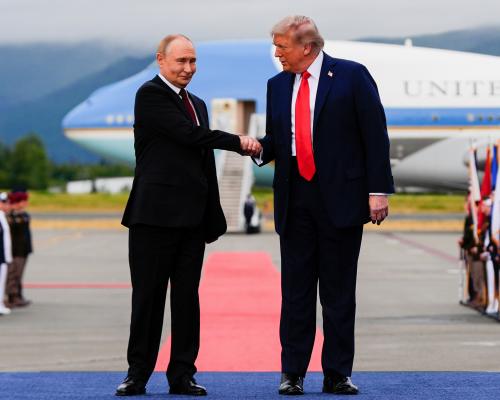
When the director of the National Institutes of Health this week said funding for the development of mRNA vaccines – the backbone of Covid vaccines – was being wound down because they had failed to “earn public trust”, it was met, publicly and privately, with exasperated incredulity.
Critics say few have done more than Jay Bhattacharya and other top health officials in the Trump administration to sow doubts about public health institutions and, by extension, the value of the vaccines that saved millions of lives around the world.
“It is astounding that Bhattacharya has the audacity to claim to know that Biden-era policies are responsible for distrust of mRNA vaccines, when he and his associates have done so much to diminish the appreciation of these important medical accomplishments,” Jeremy Berg, the former director of the National Institute of General Medical Sciences at the NIH, said in a statement to the Guardian.
Bhattacharya’s comments appeared in an op-ed in the Washington Post in which he defended a recent announcement by the health secretary, Robert F Kennedy Jr, who is anti-vaccine, to terminate $500m in federal funding for mRNA vaccine research, which Kennedy justified by claiming he had “reviewed the science”. Experts say the evidence Kennedy reviewed did not support ending the research.
While the mRNA platform was “promising” and could potentially deliver breakthroughs in the treatment of cancer and other diseases, Bhattacharya said it had failed the test of use for a public health emergency because it had not earned public trust.
“No matter how elegant the science, a platform that lacks credibility among the people it seeks to protect cannot fulfill its public health mission,” he wrote.
But the approach, experts say, is wrongheaded. It also seemed to downplay an important point: namely that the Covid vaccines had ultimately succeeded in stopping symptomatic and severe disease, even if they had not stopped infections.
Paul Offit, director of the Vaccine Education Center and an attending physician in the division of infectious diseases at the Children’s Hospital of Philadelphia, said the question was not whether the vaccines had gained public trust, but whether they worked and were safe. To which, he said, the answer was “clearly yes”.
“The vaccine isn’t running for public office. We don’t need to vote to determine whether to use it. We need to do a better job explaining the science that supports the use of the vaccine,” Offit said.
Bhattacharya’s criticism was aimed squarely at the Biden administration, even though the Covid vaccines were developed under Operation Warp Speed during the first Trump administration, a feat the president himself has touted as a major accomplishment. Bhattacharya said the Biden administration “did not manage public trust in the coronavirus vaccines” and “did not properly acknowledge Americans’ growing concerns regarding safety and effectiveness”.
Doctors and scientists interviewed by the Guardian challenged that narrative.
Jonathan Howard, a physician whose forthcoming book, Everyone Else Is Lying to You, examines how the medical establishment normalized “quackery” during the Covid pandemic and undermined public health, says Bhattacharya was “omnipresent” in the media during the early stage of the pandemic, publishing articles that generally opposed measures that tried to limit Covid.
Bhattacharya also wrongly said in March 2020 that estimates about Covid’s fatality rate “may be too high by orders of magnitude”.
The NIH head’s approach to the vaccines, Howard has alleged in his new book, was to spread “disinformation”.
“Dr Bhattacharya spent years treating rare, mild, temporary vaccine side-effects as a fate worse than death from Covid. It is galling for him to [now] use ‘mistrust’ as a pretext to destroy an entire field of scientific research,” he said.
Bhattacharya has claimed that he was the victim of censorship during the pandemic and has defended what he has called his dissenting views.
Joshua Weitz, a professor of biology at the University of Maryland and author of Asymptomatic, about how asymptomatic transmission drove Covid’s global spread, said Bhattacharya’s arguments failed to acknowledge the role the current leadership of the Department of Health and Human Services and anti-vaccine influencers had in undermining public trust.
“The success of vaccination campaigns depends both on how effective vaccines are against disease and how many individuals get vaccinated in a timely fashion,” Weitz said.
“The op-ed sows doubt regarding the number of lives saved due to Covid vaccines, favoring a recent study that claims about 2.5 million lives were saved globally rather than 10 million or more as estimated elsewhere. Even the low estimate of about 2.5 million lives saved speaks to the ability of these vaccines to make a massive public health difference at scale.”
The NIH did not respond to a request for comment.
Bhattacharya’s op-ed was concerning to some experts who saw it as a sign that the NIH is ratcheting up of rhetoric against mRNA vaccines as part of a worrying pattern. Before his confirmation as health secretary, Kennedy had already expressed reservations about mRNA vaccine technology. Once he was confirmed, researchers were reportedly advised to scrub references to mRNA vaccine technology from grant applications.
In May, the Department of Health and Human Services cancelled $776m in contracts with Moderna to develop, test, and license vaccines for flu subtypes that could trigger future pandemics, and then came Kennedy’s decision to cut research development on mRNA vaccines. The op-ed this week was another cause for panic.
“The fear is that this is just the tip of the iceberg,” said Jeff Coller, a professor of RNA biology and therapeutics at Johns Hopkins University. Coller said he found the op-ed to be both shocking and disappointing, in part because the data around the Covid vaccines was “probably some of the most convincing data for any vaccination program that we’ve ever had in human history”, from its 95% efficacy rate in two FDA trials.
“Can we continue to sustain the promise of this breakthrough technology in this climate? It does not take a lot of foresight to see that this pattern will probably manifest into policy changes.”





